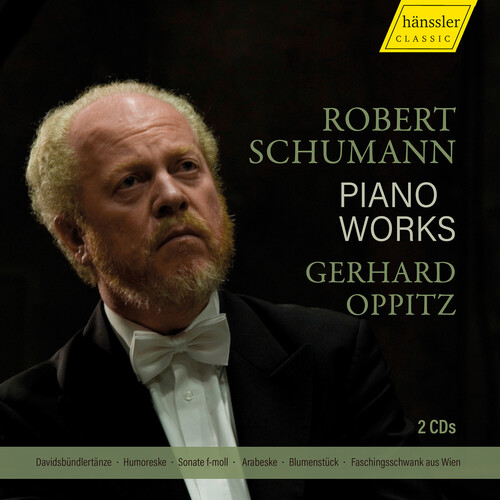Show results for
Deals
- 4K Ultra HD Sale
- Action Sale
- Alternative Rock Sale
- Anime sale
- Award Winners Sale
- Bear Family Sale
- Blu ray Sale
- Blues on Sale
- British Sale
- Classical Music Sale
- Comedy Music Sale
- Comedy Sale
- Country Sale
- Criterion Sale
- Electronic Music sale
- Fantasy Film and TV
- Folk Music Sale
- Hard Rock and Metal Sale
- Horror Sci fi Sale
- Jazz Sale
- Kids and Family Music sale
- Kids and Family Sale
- Metal Sale
- Music Video Sale
- Musicals on Sale
- Mystery Sale
- Naxos Label Sale
- Olive Films on Sale
- Page to Screen Sale
- Paramount Sale
- Pop and Power Pop
- Rap and Hip Hop Sale
- Reggae Sale
- Rock and Pop Sale
- Rock Legends
- Soul Music Sale
- TV Sale
- TV Sale
- Vinyl on Sale
- War Films and Westerns on Sale

Piano Works
- Format: CD
- Release Date: 1/6/2023

Piano Works
- Format: CD
- Release Date: 1/6/2023
- Composers: Robert Schumann
- Label: Profil - G Haenssler
- Number of Discs: 2
- UPC: 881488220452
- Item #: 2534692X
- Genre: Classical
- Release Date: 1/6/2023

Product Notes
Within the realm of Romantic piano music, where new discoveries are constantly just around the corner, the contribution of Robert Schumann has always played a major part. True, he cannot rival the aura of Chopin's works, of which Ignaz Friedman asserted that not only had Chopin opened the piano with them, he had closed it again. (Schumann paid his own tribute in his reverent review of Chopin's op. 2 of 1831, the Variations on Mozart's "Reich mir die Hand, mein Leben"). Nor did Schumann embed in the history of piano playing such milestones of technical mastery and manual dexterity as Liszt who - inspired by Paganini's concerts and enabled by the double-escapement action developed by Sébastien Erard in 1821 - had practically reinvented the instrument by the time he wrote his Etudes d'exécution transcendante in 1837. And neither the sprightliness of Felix Mendelssohn's keyboard idiom nor Charles-Valentin Alkan's exaltation of virtuosity are characteristic of Schumann's piano music, even if he proves in his Abegg Variations op. 1 (1830) and his Toccata op. 7 (1832) that he brilliantly commanded both approaches to the instrument.

